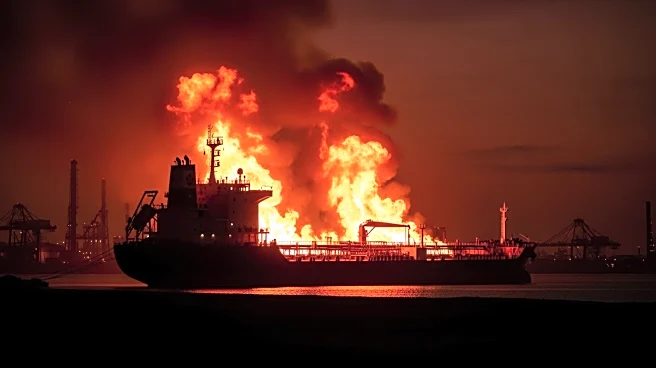What's Happening?
A drone attack in the Russian port of Tuapse on the Black Sea resulted in a fire on an oil tanker during the night of November 1-2, 2025. According to authorities in Russia's Krasnodar Krai, debris from
the drone fell on the tanker, damaging its deck superstructure and causing a fire. The crew was evacuated safely. The incident also led to damage in the nearby village of Sosnovyi, affecting an apartment building and partially hitting the local railway station. The port of Tuapse is a significant export hub for Russia, housing a Rosneft oil terminal and refinery, which have been frequent targets of Ukrainian attacks. This attack is part of a broader strategy by Kyiv to intensify strikes on Russian oil refineries and fuel depots, aiming to disrupt Russian military logistics and increase the cost of war for Moscow.
Why It's Important?
The attack on the Tuapse port underscores the ongoing strategic efforts by Ukraine to weaken Russian military capabilities by targeting critical infrastructure. The port is vital for Russia's oil exports, and disruptions here could have significant economic implications, potentially affecting global oil markets. The incident highlights the escalating tensions and the increasing use of drone warfare in the conflict, which poses risks not only to military targets but also to civilian infrastructure. This development could lead to heightened security measures and further military responses from Russia, potentially escalating the conflict further.
What's Next?
In response to the attack, Russia may increase its defensive measures around key infrastructure and possibly retaliate with heightened military actions against Ukraine. The international community will likely monitor the situation closely, as further disruptions in oil exports could impact global energy prices. Diplomatic efforts may intensify to de-escalate the situation, but the ongoing conflict suggests that military engagements will continue to be a significant aspect of the geopolitical landscape in the region.
Beyond the Headlines
The use of drones in modern warfare is becoming increasingly prevalent, raising ethical and legal questions about their deployment in conflict zones. The ability to target critical infrastructure remotely poses new challenges for international law and the rules of engagement. This incident may prompt discussions on the need for updated regulations and agreements on the use of unmanned aerial vehicles in warfare.









